Samsung SSD XP941 Review: The PCIe Era Is Here
by Kristian Vättö on May 15, 2014 12:00 PM ESTMac Benchmarks: QuickBench, AJA & Photoshop Installation
Since the XP941 is currently only bootable in Macs, I decided to run some benchmarks with the XP941 inside a Mac Pro. The specs of the Mac Pro are as follows:
| Test Setup | |
| Model | Mac Pro 4.1 (Early 2009) |
| Processor | Intel Xeon W3520 (2.66/2.93GHz, 4/8, 8MB L3) |
| Graphics | NVIDIA GeForce GT120 512MB GDDR3 |
| RAM | 12GB (2x4GB + 2x2GB) DDR3-1066 ECC |
| OS | OS X 10.9.2 |
We would like to thank RamCity for providing us with the Mac Pro, so we were able to run these tests and confirm boot support.
I installed OS X 10.9.2 to all drives and they were the boot drives when benchmarked, just like they would be for most end users. As I mentioned on page one, RamCity actually sent us two 512GB XP941 and I just had to put them in RAID 0 configuration. With a Mac you can easily boot from a software RAID 0 array, so all I had to do was to create a RAID 0 array in Disk Utility and select it as the boot volume. I placed the drives in PCIe slots 2 and 4 to ensure that both drives were getting full PCIe bandwidth and we wouldn't run into bottlenecks there. I picked Intel's 480GB SSD 730 to be the comparison point as it was lying on my table and is among the fastest SATA 6Gbps SSDs in the market. Note that the 2009 Mac Pro only supports SATA 3Gbps, so there's obviously some performance penalty from that as the benchmarks show.
QuickBench
QuickBench is one of the more sophisticated drive benchmark tools for OS X. It's shareware and retails for $15 but compared to the freeware tools available, it's worth it. While QuickBench lacks the option to increase queue depth, it supports various transfer sizes from 4KB to up to 100MB (or more through a custom test). For this test, I just ran the standard test where the IO sizes range from 4KB to xMB. Additionally I ran the extended test, which focuses on very large IOs (20-100MB) in order to get the maximum performance out of the drives. In both cases the tests ran for 10 cycles to ensure sustained results.
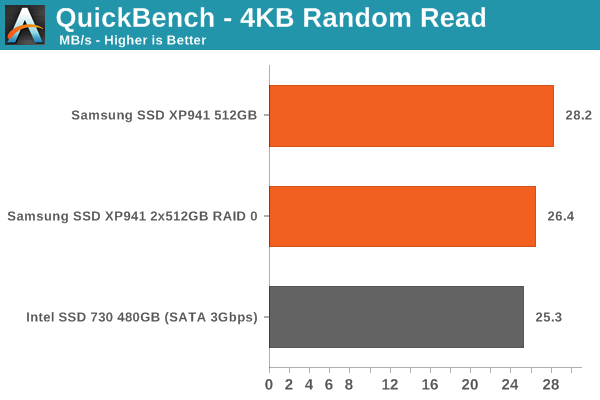
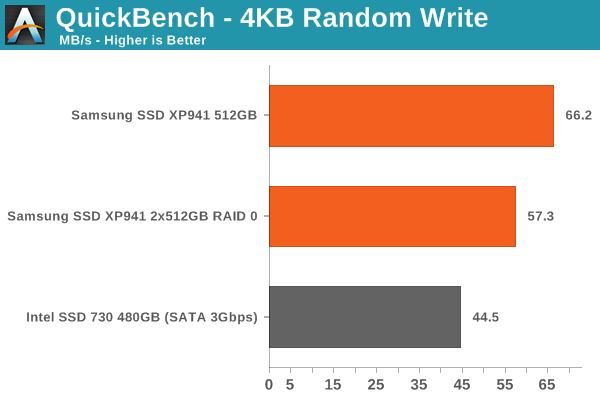
The random results don't reveal anything interesting. The RAID 0 array is slightly slower due to the overhead from the software RAID configuration but overall the results make sense when compared with our Iometer scores. Bear in mind that QuickBench only uses queue depth of 1, whereas our Iometer tests are run at queue depth of 3, hence there's a difference that is roughly proportional to the queue depth.
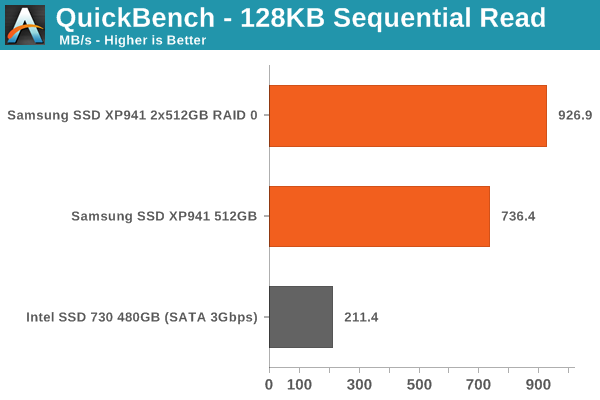
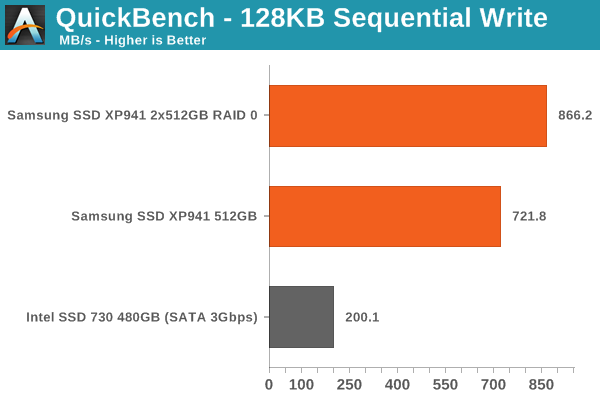
The sequential tests show that the XP941 seems to be slightly slower in the Mac Pro compared to sequential performance in Iometer. In this case both tests are at a queue depth of 1 and should thus be comparable, but it's certainly possible that there are some other differences that cause the slightly slower performance. Either way, we are still looking at much, much higher performance than any drive would provide under the Mac Pro's native SATA 3Gbps interface.
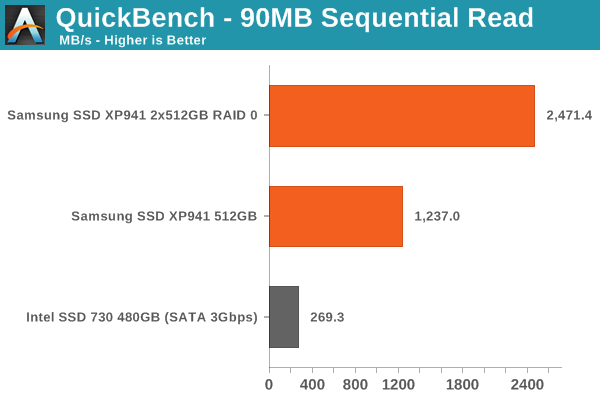
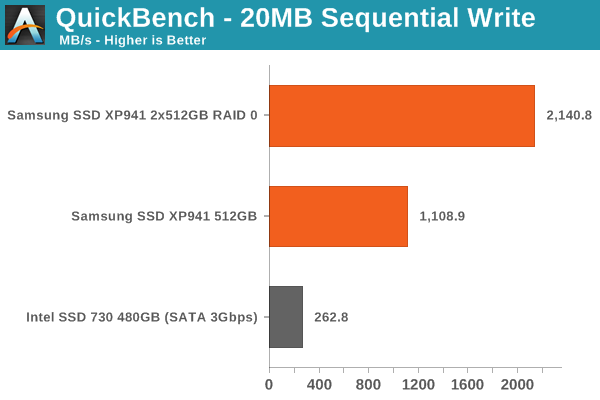
Since QuickBench doesn't allow increasing the queue depth, the only way to increase performance is to scale the transfer size. QuickBench's preset tests allow for up to 100MB IO sizes and I ran the preset that tests from 20MB to 100MB and picked the highest perfoming IO sizes that were 90MB and 20MB in this case. There wasn't all that much variation but these seemed to be the highest performing IO sizes for all three configurations.
Now the XP941 and especially RAID 0 show their teeth. With two XP941s in RAID 0, I was able to reach throughput of nearly 2.5GB/s (!) and half of that with a single drive. Compared to the SSD 730 in the SATA 3Gbps bus, you are getting over four times the performance and to reach the performance of X941 RAID 0 you would need at least ten SSDs in a SATA 3Gbps RAID 0 configuration.
AJA System Test
In addition to QuickBench, I decided to run AJA System Test as it's a freeware tool and quite widely used to test disk performance. It's mainly designed to test the performance of video throughput but as the results are reported in megabytes per second, it works for general IO testing as well. I set the settings to the maximum (4096x2160 10-bit RGB, 16GB file size) to product the results below.
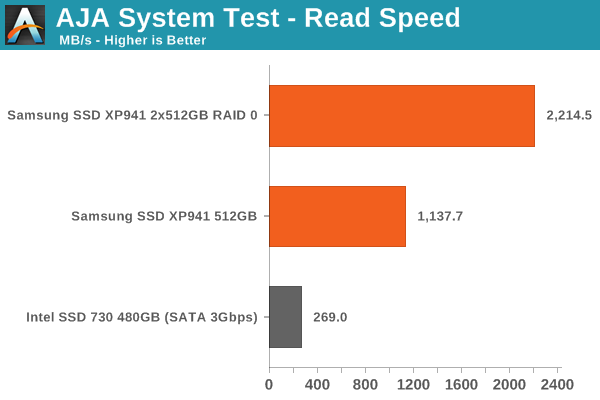
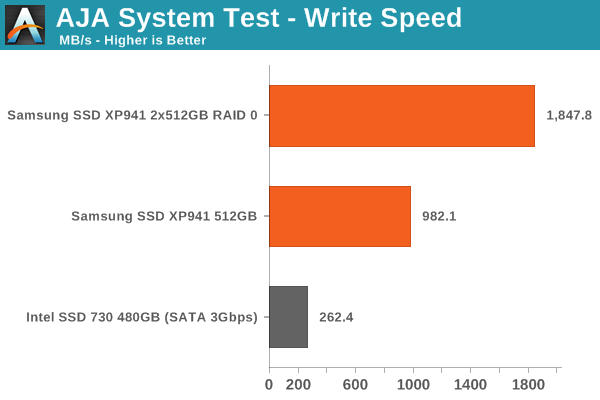
The results are fairly similar to the QuickBench ones but the performance seems to be slightly lower. Then again, this is likely due to the difference in the data the software uses for testing but the speeds are still well over 1GB/s for a single drive and 2GB/s for RAID 0.
Adobe Photoshop CS6 Installation
One of the most common criticism I hear towards our tests is that we don't run any real world tests. I've been playing around with real-time testing a lot lately in order to build a suite of benchmarks that meet our criteria but for this review I decided to run a quick installation benchmark to see what kind of differences can be expected in real world. I grabbed the latest version of Photoshop CS6 trial from Adobe's website and installed it to all three drives while measuring the time with a stopwatch.
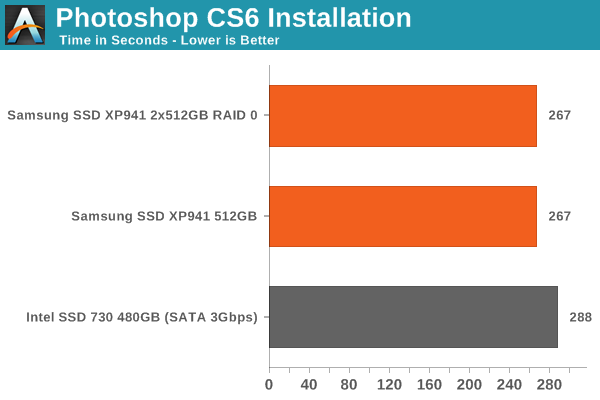
Obviously the gains are much smaller in typical real world applications. That's because other bottlenecks come to play, which are absent when only testing IO performance. Still, especially for IO heavy workloads the extra performance is always appreciated even if the gains aren't as substantial as benchmarks show.










110 Comments
View All Comments
BMNify - Friday, May 16, 2014 - link
rod, if you go ,as well as Everspin, look out for Crocus Technology Russian MRAM HW makers ARM licenced their IP , and Avalanche Technology tooRamCity - Monday, May 19, 2014 - link
Yes, I will be going to Computech. I'll add those vendors to my visit list and check out what they are up to if they have a booth.RamCity - Monday, May 19, 2014 - link
I mean Computex!Jay77 - Thursday, May 15, 2014 - link
I suppose I should read more than the first and last pages if I'm going to make comments.Babar Javied - Thursday, May 15, 2014 - link
There is a mistake/typo in "Performance Consistency & Trim Validation" under the "Trim Validation" section. Below the first graph in the said section, you have wrote "doesn't treat PCIe drives the same even if the utilize the same AHCI" when you ment to say "even if THEY utilize the same AHCI"Ryan Smith - Thursday, May 15, 2014 - link
Fixed. Thank you for pointing that out.BMNify - Thursday, May 15, 2014 - link
so basically you gimped the one and only raid 0 test by not doing it in windows or even better simply boot any linux iso/usb stick and formatted the ssd-xp941 WITH the samsung "F2FS" file system for maximum speed as that is written especially for ssdKristian Vättö - Saturday, May 17, 2014 - link
I did RAID the XP941s in Windows as well but the results were similar so I figured that there is no need to report the results separately.rocky12345 - Thursday, May 15, 2014 - link
I like that there are extra speed speed in these new devices but it seems everyone is so stuck on more speed more speed..lol I am sorry but when a standard SSD can boot a windows 7 in about 6 seconds when are people going to be happy. My Asus laptop has a SSD in it & boots in about 6 to 7 seconds & things like firefox open even before my finger un-clicks the mouse button to open firefox. now everyone is saying standard SSD is to slow..lol to funny. What I would rather like to see is bigger SSD drives at a better price. We already have good speed but the big drives still cost to much for most people when they can make a 1TB SSD at about the same or just slightly more than a standard hard drive then maybe they should be more worried about all these new extreme speed drives but if they make standard SSD drives go the way of the doo doo bird then we are never going to see low priced SSD anything because they will always be treating anything SSD related as new tech just a thought.BMNify - Thursday, May 15, 2014 - link
"but it seems everyone is so stuck on more speed more speed..lol I am sorry but when a standard SSD can boot a windows 7 in about 6 seconds when are people going to be happy..."well obviously speed is not for you, but how do you expect current non volatile ram to lower in price if they don't bring out newer kit to replace it at today's higher price points !
im not sure you understand the driving forces here as regards people wish for faster data access, we really need/WANT a so called "universal non volatile ram [such as those Everspin ST-MRAM DDR3 DIMMs referenced ]" sooner than later at equivalent ddr3 2400,wideIO2,HMC speeds and configurations so we can start to take better advantage of the higher data throughput and data manipulation these bring to the table, its not good enough to x264 encode UHD content in real time right now, then and only then will we start to consider we are starting to get close to enough general speeds, ALIMO.... YMCV